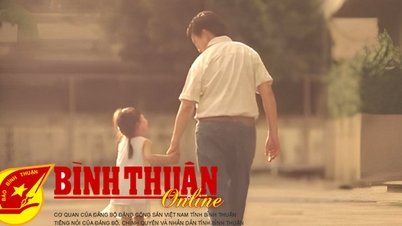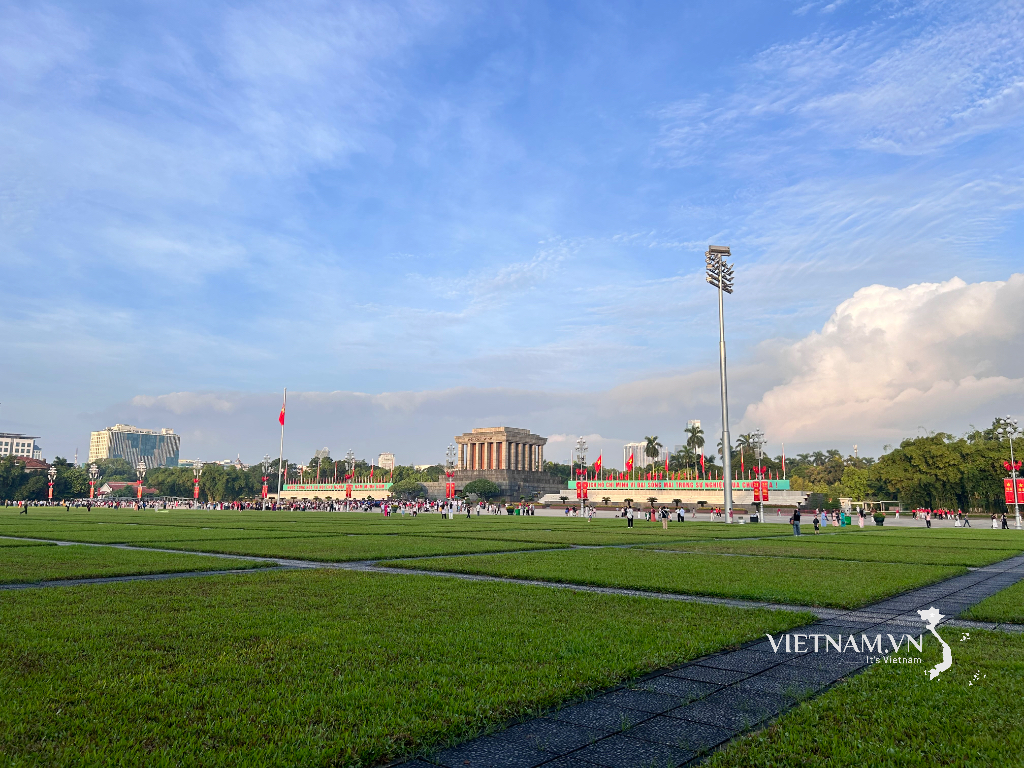(In response to reading the poem "April Arrives" by author Vu Tram, published in Binh Thuan Weekend Newspaper, issue dated March 29, 2024).
Poet and teacher Vu Tram has just sent readers a poem written under the school roof during the early days of summer. In "April Arrives," the poet encapsulates fresh emotions and expresses them in a unique way through his words.

What feelings of longing did our poet express in this poem? Perhaps it was: "Hesitating endlessly, spring must eventually bid farewell / The season leans in the strange sunlight, April arrives." No matter how much time is tried to prolong the delay, spring must eventually say goodbye. And so, the earth and sky must transition to another phase, a different weather, so that "The season leans in the strange sunlight." The change of seasons, the beginning of summer, the sunlight is different from the poet's perspective.
Furthermore, the poet has recognized "April's golden buds burst forth on the dike." Almost everyone knows that a "bud" is a part of a tree branch, a rounded, curved shape, about to bloom into a flower. In this second stanza, the poet uses "golden buds burst forth on the dike." This is a unique description by the poet, depicting the image of rounded sunbeams on the dike. This image seems to complement the "unusual sunlight" as the seasons change.
The lyrical persona in the poem is once again evoked. This longing comes from the young branches in the schoolyard. “April, swaying shoots of memory in the hands.” The young branches of the trees in the schoolyard are just ordinary twigs, but through the poet's perception, they become “shoots of memory,” “swaying” in the hands of the lyrical persona in this poem about summer. These young branches sway in the hands, and then, a little more emotion becomes deeper, more passionate: “What heartbeat is stranded under the canopy of trees?” What creature that has never lived underwater would be stranded on the shore? With Vu Tram, he leads the reader along his unique emotional journey when expressing “A stranded heartbeat.” A deep, passionate longing in the heart of the young man as he gazes at the girl with her hair flowing by the lecture hall. This affection and passion are not far away, but right under the canopies of the beloved school.
And so, how many seasons have passed on this planet? Can humankind count the age of the seasons? All the joys and sorrows of human life will eventually drift away like the aimless clouds in the sky: "Seasons come and go, seasons have no age / Memories also grow old, gently rolling along with the clouds."
In the fifth and final stanza, the author skillfully introduces a line that leaves the reader with a sense of incompleteness, prompting reflection: "You are like and I seem like." Perhaps this represents the mutual affection between the two of us, the lyrical characters in the poem, under the school roof. A shy, unspoken yet deeply profound feeling, not yet fully expressed in words. The line leaves the conversation between the lyrical characters, and it seems the author also wants to leave it open for poetry lovers. And then there are the melancholic feelings of farewells in the summer: "We parted, and summer also poured down drops of pain."
The poet and teacher Vu Tram truly put a great deal of effort into carefully selecting and expanding upon language in his own unique way, weaving together verses rich in imagery and imbued with emotion in "April Comes."
Using the eight-syllable verse form, the author employs a highly flexible rhythmic structure in the poem. Reading each line carefully, readers will notice numerous rhythmic patterns: 3/5 (used 6 times), 5/3 (5 times), 4/4 (4 times), 2/6 (2 times), 2/4/2 (2 times), and 3/3/2 (1 time). This flexible rhythmic structure, combined with the constantly changing tones of the syllables, significantly enriches the musicality of the poem "April Comes."
Many summers have passed in the lives of people across generations. Countless poems and songs have left their mark on the hearts of listeners and readers, reflecting on the summer season. Teacher and poet Vu Tram contributes verses that capture his unique feelings about the beginning of summer. Reading "April Comes," readers are reminded once again of their schools and the memories that flowed through their youthful years. Within this stream of nostalgia, the beautiful verses of "April Comes" are gentle yet easily imprinted in the memories of poetry lovers!
Source



![[Image] The tenacious fighting spirit of Vietnamese women's football](/_next/image?url=https%3A%2F%2Fvphoto.vietnam.vn%2Fthumb%2F1200x675%2Fvietnam%2Fresource%2FIMAGE%2F2025%2F12%2F17%2F1765990260956_ndo_br_4224760955870434771-copy-jpg.webp&w=3840&q=75)
![[Image] Leaked images ahead of the 2025 Community Action Awards gala.](/_next/image?url=https%3A%2F%2Fvphoto.vietnam.vn%2Fthumb%2F1200x675%2Fvietnam%2Fresource%2FIMAGE%2F2025%2F12%2F16%2F1765882828720_ndo_br_thiet-ke-chua-co-ten-45-png.webp&w=3840&q=75)
![[Live] 2025 Community Action Awards Gala](/_next/image?url=https%3A%2F%2Fvphoto.vietnam.vn%2Fthumb%2F1200x675%2Fvietnam%2Fresource%2FIMAGE%2F2025%2F12%2F16%2F1765899631650_ndo_tr_z7334013144784-9f9fe10a6d63584c85aff40f2957c250-jpg.webp&w=3840&q=75)
![[Photo] Prime Minister Pham Minh Chinh receives the Governor of Tochigi Province (Japan)](/_next/image?url=https%3A%2F%2Fvphoto.vietnam.vn%2Fthumb%2F1200x675%2Fvietnam%2Fresource%2FIMAGE%2F2025%2F12%2F16%2F1765892133176_dsc-8082-6425-jpg.webp&w=3840&q=75)
![[Photo] Prime Minister Pham Minh Chinh receives Lao Minister of Education and Sports Thongsalith Mangnormek](/_next/image?url=https%3A%2F%2Fvphoto.vietnam.vn%2Fthumb%2F1200x675%2Fvietnam%2Fresource%2FIMAGE%2F2025%2F12%2F16%2F1765876834721_dsc-7519-jpg.webp&w=3840&q=75)


































































![[Live] Closing Ceremony and Award Presentation for the "Impressive Vietnam Tourism" Video/Clip Creation Contest 2025](https://vphoto.vietnam.vn/thumb/402x226/vietnam/resource/IMAGE/2025/12/17/1765974650260_z7273498850699-00d2fd6b0972cb39494cfa2559bf85ac-1765959338756946072104-627-0-1338-1138-crop-1765959347256801551121.jpeg)




















Comment (0)